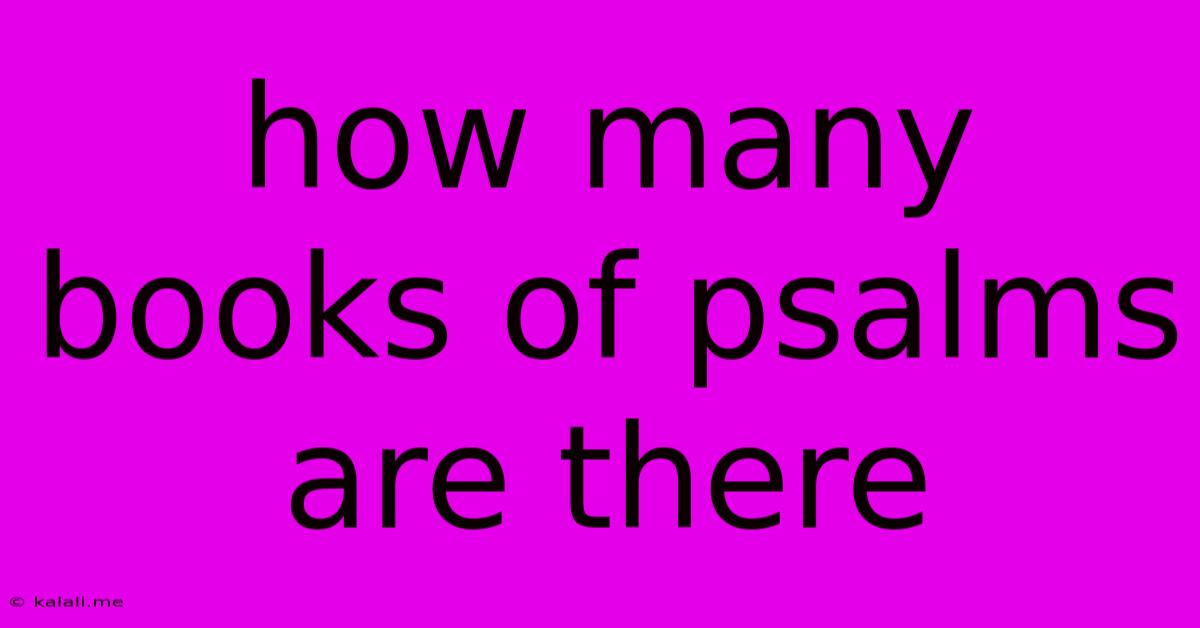How Many Books Of Psalms Are There
Kalali
May 21, 2025 · 3 min read

Table of Contents
How Many Books of Psalms Are There? Understanding the Structure of the Psalter
The question "How many books of Psalms are there?" isn't as straightforward as it seems. While the answer is generally considered to be one, understanding the structure and divisions within the Book of Psalms provides valuable context and reveals why the question might even be asked. This article will explore the different perspectives on this seemingly simple query, delving into the historical and literary aspects of the Psalter.
The Book of Psalms, also known as the Psalter, is a collection of 150 poems and hymns used in Jewish and Christian worship. It's a crucial part of both the Hebrew Bible (Tanakh) and the Christian Old Testament. While the entire collection forms a single book in modern Bibles, understanding its internal structure helps clarify the nuances of the question about the number of "books."
The Five Books of Psalms: A Traditional Division
The Psalter is traditionally divided into five books, mirroring the five books of Moses (the Pentateuch). This division isn't arbitrary; it provides a framework for understanding the theological themes and literary development within the collection. These five books are often marked by doxologies, or praises to God, acting as natural breaks within the larger text. The divisions are as follows:
- Book 1 (Psalms 1-41): Focuses on personal lament and praise, often highlighting individual struggles and God's faithfulness.
- Book 2 (Psalms 42-72): Emphasizes the themes of exile and restoration, reflecting the hopes and anxieties of the Israelite people.
- Book 3 (Psalms 73-89): Contains more wisdom psalms and reflections on God's judgment and justice. Questions of suffering and the righteous are prominent.
- Book 4 (Psalms 90-106): Features a blend of communal and individual psalms, including historical narratives and expressions of praise.
- Book 5 (Psalms 107-150): Culminates in powerful expressions of praise and thanksgiving, often celebrating God's power and mercy.
These five books aren't separate books in the sense of being independently published volumes. Instead, they represent a structural division within the larger, unified Book of Psalms. The internal divisions enhance the overall reading experience and offer thematic coherence to the diverse collection of Psalms.
Why the Question Might Arise: Understanding Different Perspectives
The question of "how many books" might stem from a few different angles:
- Historical Context: Ancient manuscripts might have had different formatting or divisions, leading to varying perceptions of the book's structure.
- Scholarly Analysis: Different scholarly approaches might highlight the importance of the five-book structure over the single-book presentation.
- Liturgical Use: Different liturgical traditions might emphasize or highlight different sections of the Psalter, giving a sense of separate units.
Conclusion: One Book, Multiple Perspectives
In conclusion, the answer to the question, "How many books of Psalms are there?" is definitively one. The Book of Psalms is a single, unified collection. However, the traditional division into five books provides a crucial framework for understanding the literary and theological development within the Psalter. Recognizing this internal structure enhances our appreciation of the richness and complexity of this invaluable collection of sacred writings. Understanding these different perspectives is key to engaging fully with this rich and enduring body of work.
Latest Posts
Latest Posts
-
How To Wire A 3 Way Switch
May 21, 2025
-
Why Is My Car Revving High When Accelerating
May 21, 2025
-
Does Passport Number Change After Renewal Uk
May 21, 2025
-
What Is The Orange Part Of A Scallop
May 21, 2025
-
How Many Tea Bags For A Pot Of Tea
May 21, 2025
Related Post
Thank you for visiting our website which covers about How Many Books Of Psalms Are There . We hope the information provided has been useful to you. Feel free to contact us if you have any questions or need further assistance. See you next time and don't miss to bookmark.